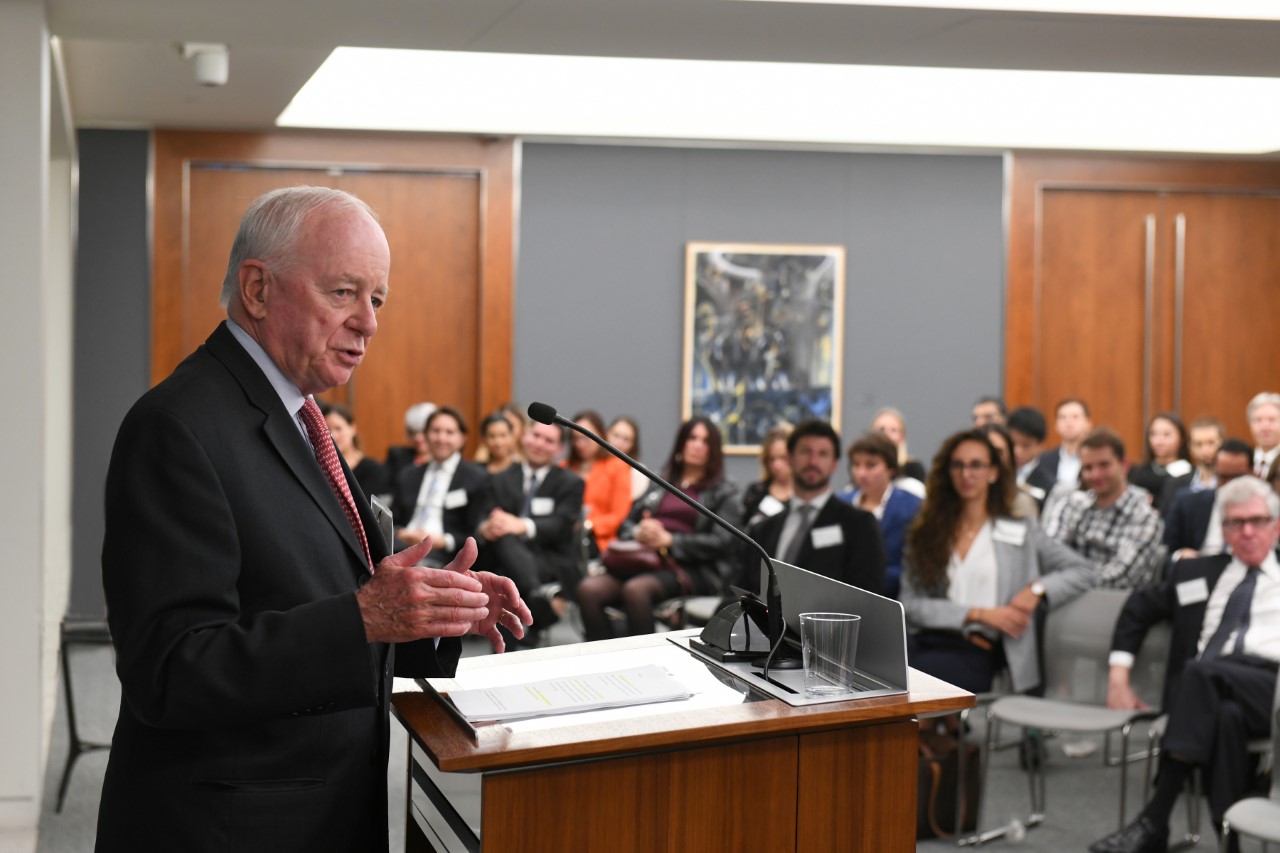International Arbitrator Yves Fortier Discusses the Challenges for Investment Arbitration

On October 19, International Arbitrator Yves Fortier delivered the 2019 Annual Lecture of AUWCL's Center on International Commercial Arbitration. Fortier’s lecture was entitled “Long Live the Golden Summer: Arbitration, Litigation, and Cola,” and discussed the challenges of the international system of investment dispute settlement and the proposed amendments to tackle these challenges. He compared the discussions about the reform of Investor-State Dispute Settlement (ISDS) with an episode between Coke and Pepsi. Pepsi Cola developed a successful marketing campaign in which customers were blindfolded and given two types of colas to taste. The overwhelming majority chose Pepsi as the better one. Coke reacted by making its own taste more likely to Pepsi, but Coke’s costumers were outraged over this change and the company had to backtrack. Yves Fortier summed up the lesson learned from this episode, indicating that Coke failed to realize the significant difference between what people like to taste and what they like to drink. In analyzing four areas in which proposals to modify investment arbitration had been brought forward, Fortier showed that investment arbitration risks positioning itself in the same situation as Coke.
First, Fortier addressed the proposal of establishing permanent courts in place of the current ad-hoc panels. The European Union (EU) is among the main proponents of a standing court, as evident in the comprehensive trade agreement between the EU and Canada (CETA). In its submission to the United Nations Commission on International Trade Law (UNCITRAL) working group, the EU positioned that a standing court will address the alleged lack of consistency, coherence, predictability, and correctness of arbitral decisions; the high costs and duration of ISDS cases; and concerns about perceived lack of independence and impartiality of arbitrators.
Fortier countered these ideas with the five E’s of arbitration: efficiency, expedition, expertise, evenhandedness, and enforceability. According to Fortier, the consent-based mechanism as well as the arbitration formula has reported well for thousands of years across many countries and cultures. Arbitration allows parties to choose arbitrators versed in the issues underlying the disputes, and arbitration awards are final and binding, as well as enforceable thanks to the 1958 New York Convention.
A second concern of the EU relates to the significant costs and delays associated with arbitration. In response, Fortier argued that the integrity of the arbitral process is the most important aspect to consider. In his view, if the delays ensure party autonomy, confirm impartiality, and provide expertise, the delays are justified. He further raised the caveat that permanent courts may become overwhelmed with cases just as the national courts are.
A third concern is the gender gap. Fortier acknowledged the issue but stressed that a number of competent women now sit as arbitrators. He also questioned if it would be realistic to address gender disparity in international arbitration through a standing court. Such a diversity requirement would centralize the market for arbitrators to the standing court system, and consequently reduce the total number of female arbitrators. This solution might encourage the appointment of female arbitrators, but would severely limit the opportunities for women in the field outside of the court system.
The fourth and final concern was the lack of an appeal mechanism for awards, which allegedly leads to inconsistencies. Fortier responded that an appeal system would be counter to one of the key advantages of arbitration, i.e. the finality of awards. While he observed that appeals could possibly improve consistency and cure incorrect decisions, in his view, an appeal would prolong the dispute. In fact, Fortier questioned whether the tribunals would feel obliged to follow precedent as every case is different and similar cases do not necessarily have the same legal solution.
Fortier asked arbitrators to continue working to provide arbitration as a form of dispute resolution. Fortier remarked that the popularity of arbitration has grown despite all the criticism. Arbitration is a proven and effective method for those disputes that do not lend themselves to adjudication in domestic courts. Fortier reiterated that making arbitration more like litigation is tantamount to making Coke taste like Pepsi.
The AUWCL’s Fourteenth Annual International Arbitration Lecture was sponsored by Arnold & Porter and hosted by Horacio Grigera Naón, international arbitrator and director of AUWCL’s Center on International Commercial Arbitration. The annual lecture drew an audience of more than 150 arbitrators, practitioners and students. The lecture in previous years has been delivered by William Park, Pierre Mayer, Pierre Tercier, Bernardo Cremades, Bernard Hanotiau, VV Veeder QC, Gabrielle Kaufmann-Kohler, Yves Derains, and Jan Paulsson.